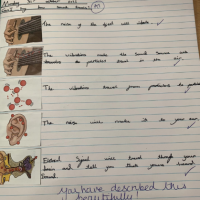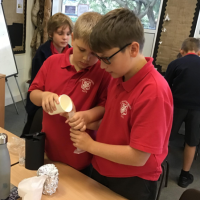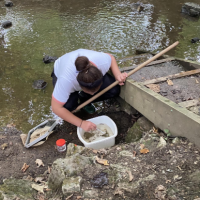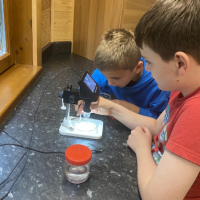Science
Subject Rational
At the heart of Science at St Mary’s is a desire to explore and understand the world around us. We want our pupils to be curious learners. We encourage them to confidently question, carefully investigate and slowly build a deep knowledge of the world in which we live. Our aim is to help children understand the uses and implication of science today and for the future.
Our curriculum is sequenced in line with the National Curriculum, meaning children will leave St Mary’s with a broad scientific understanding across the disciplines of chemistry, biology and physics. Children will build their knowledge year on year, continuously revisiting and embedding core knowledge. We want our pupils to leave St Mary’s with a fundamental knowledge base, ready and prepared to dive into science at secondary school.
Alongside gaining this scientific knowledge, children will set up, safely carry out and analyse investigations, giving them an understanding of scientific processes and building their enquiry skills. Our curriculum promotes the development of essential, transferrable skills such as observation, teamwork and communication.
How we teach Science
Science is taught weekly as a core subject at St Mary’s. Key objectives are taken directly from the National Curriculum and our comprehensive knowledge and skills progressions set out the key learning to take place in each year group and for each unit. Units are organised in a two year rolling programme, ensuring wide-ranging coverage of all the skills and knowledge the children will need to advance to the next stage of their learning.
Key Stage 1
At St Mary’s, we passionately believe that children under 7 learn best through play and exploration. In science, this provides the opportunity for children to discover things that are new to them through first hand experiences. We strive to encourage curiosity and learning through a mixture of adult led activities and continuous provision. Introducing a new topic is often done through adult led instruction. Children will sit on the carpet and be introduced to key vocabulary and key concepts that need to be directed by the teacher as an expert. Children also have the opportunity to learn in a group guided by either the teacher or a TA in order to ensure the skills and knowledge is being practised correctly, avoid misconceptions and assess understanding. Finally, children often learn through a child led activity in continuous provision. This might be linked to the skills and knowledge they are learning in the whole class sessions or it could be a repeat of the adult led activities for children to access independently. These activities are monitored and adjusted, added or removed based on the children's’ interest and understanding.
Key Stage 2
In KS2, children learn science through direct instruction and teacher led activities. An emphasis is placed on learning, recalling and embedding key knowledge. This is done in a variety of ways including questioning, quizzes and recall activities. Children also regularly plan and carry out investigations. This may be in order to explore and discover new knowledge, or they could be used to embed knowledge already learnt. Across the phase, children will carry out investigations that cover the full range of enquiry types outlined in the National Curriculum.
How Science is assessed at St Mary’s
Throughout each lesson and unit, teachers are continually assessing the children’s understanding through questioning, observing and marking work completed. This will help the teachers develop lessons to address difficulties or misconceptions the children have. Children also regularly have the opportunity to assess their own learning and that of their peers. Teachers will conduct termly assessments of each child against the knowledge and skills progression maps.




